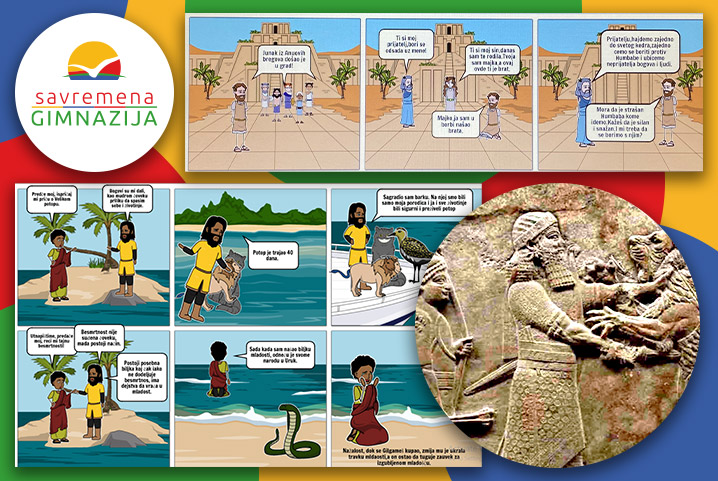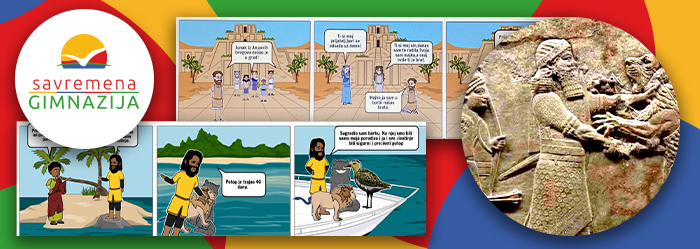
Students of Savremena Gimnazija approached the task of interpreting one of the oldest literary works in history, the Epic of Gilgamesh, in a truly different and interactive way.

In order to encourage her students to draw their own conclusions and analyse literary motifs and elements using a problem-based approach, Serbian Language and Literature teacher thought of an interesting topic for discussion. Given that this literary work contains numerous universal and timeless motifs and problems, the teacher raised the question of good and evil. What is good and what is evil? How can we distinguish between the two? What are the parameters, i.e. criteria for judgment? Students were encouraged to critically analyse the serpent's motif in the Epic of Gilgamesh and its appearance, to determine whether it is good or evil, and to present arguments for their claims by quoting verses from the epic.
Original and creative works of Savremena’s students offered a variety of interpretations and answers to these questions.
Is the serpent in the Epic of Gilgamesh good or evil?
I must admit that, when I first looked at the topic, I thought the answer to the question was rather obvious. The serpent is evil! Or that's what I used to think. It is because of the serpent that Eve gave Adam the apple, and they were cast out of heaven as punishment. It is cunning, conniving and manipulates people into committing misdeeds. It is deadly, which is why we are so afraid of it.
It seems the serpent wronged Gilgamesh as well. It stole the seaweed which rejuvenates and prolongs life.
But are things so simple?
When I thought about it for a while, I wasn't sure. I learnt that the lesson of the Epic of Gilgamesh is that one should come to terms with the fact that man is a mortal being and that our time on this earth is limited. One should learn to do good deeds in one's earthly life.
If these are the messages of the poem, then it seems the serpent didn't do any harm. Had not the serpent stolen the plant, Gilgamesh might have still believed he could be as immortal as the gods. Perhaps he would have remained as ruthless and arrogant as he had been at the beginning of the poem. That's why I think the serpent helped him to face the fact that men are not gods, and are therefore mortal.
All things considered, it seems only fair to admit I can't decide on good or evil to the exclusion of the other.
Filip Petrović, I-6
The serpent. That cold-blooded, hairless and featherless creature is one of the most common mythological symbols. In mythology, religion and literature, the serpent symbolises resurrection and immortality, but also deceitfulness, unadulterated evil and death. But what does the serpent actually symbolise in the Epic of Gilgamesh?
At first glance, we could say that, by taking away the only cure for mortality, the serpent deprives not only Gilgamesh, but his entire race of the possibility of eternal life, and identification with the gods. If we look at it that way, we could say the serpent is an evil creature that brings misfortune to Gilgamesh and the citizens of Uruk. However, if we actually take some time and think about what the serpent did, we will come to the conclusion that it is not true. By taking away the seaweed of immortality from Gilgamesh, the serpent restored the natural balance and let the gods remain the only immortals, while giving Gilgamesh the most precious gift. The serpent taught Gilgamesh that every human being has a limited life span which must come to an end, as well as that mistakes made during one's lifetime cannot be forgotten, but have to be punished without exception.
In my opinion, although it seems the serpent took away the thing he desired most from Gilgamesh, it gave him the most precious gift nonetheless – it taught him that one good turn deserves another, i.e. do good and good will come to you, which is why it did a good deed in the Epic of Gilgamesh.
Milica Bošković, I-6
At first glance, and before any detailed analysis of the poem, it seems the serpent did irreparable harm to Gilgamesh. Imagine the one thing that could bring your loved one back to life stolen from you. And just when you thought everything would go back to normal, and rediscovered your will to live. I firmly believe no person could forgive such 'evil' to anyone.
We can only guess if the serpent stole or took the grass of life with which Gilgamesh wanted to save the life of his best friend Enkidu. But, if we look at things from another point of view ̶ had Gilgamesh had stronger beliefs, or a 'purpose" as the strongest and most powerful half-god who ever walked the earth, he would have never allowed the serpent to take away the only thing he put his hopes in so easily. I think a part of him firmly believed he would meet Enkidu again at some point after death, but no matter how sad he was, he was also too proud to admit it. Looking at things from that perspective, the serpent greatly alleviated his pain. He knew beyond any doubt then that there was no way to save himself or Enkidu, so he didn't fight for the seaweed. He just couldn't.
After thinking hard on whether the serpent did good or evil, my opinion remains undivided. Why, when in order to make his life complete, man needs a "second half", which is even mentioned in the Bible: No man is created to live on bread alone, or walk this earth alone". I cannot get one question out of my mind – what would have happened if Gilgamesh had succeeded and resurrected Enkidu using the seaweed? As empty as he was inside, and had he not had the serpent as the obstacle, would he have succeeded anyway?
Lara Veselinović I-6
Savremena’s teacher Marina Kuzmanović was extremely satisfied with the creativity, skills and knowledge her students demonstrated yet again, as well as with their philosophical musings on general issues. Each paper was authentic and original in its own way, an expression of each student's unique personality.
Creative comics of Savremena’s students depicting topics covered in the Epic of Gilgamesh
The Epic of Gilgamesh was the inspiration for students of I-4 class, who used the Storyboard That software to create comics on this topic.
To help students understand, memorise and critically analyse the motifs and messages of the Epic of Gilgamesh, Serbian Language and Literature teacher Ivana Mirović gave them a task to create a comic on this topic using the Storyboard That software. The idea was to link the comic book as a relatively young form of art with the poem that is over 3,500 years old, because the formal characteristics and narration in the Epic of Gilgamesh have many things in common with the techniques used in the comic. The students outdid themselves.
"The students demonstrated their creativity, knowledge and IT skills once again depicting the atmosphere from the poem, choosing characters and highlighting the verses they considered crucial. I believe that this method of transferring knowledge will make the student's knowledge more durable", said teacher Ivana Mirović.
Take a look at original and inventive comic books of Savremena’s students.




















